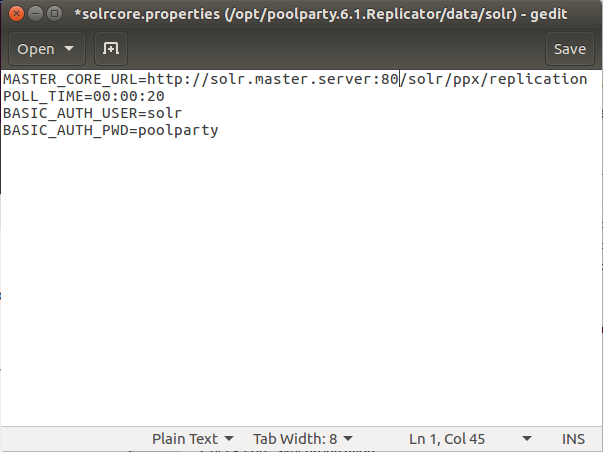Install and Configure Additional Extractor Instance for High Availability (Linux)
The following guide gives detailed instructions on how to install an additional extractor instance for high availability (slave server) on Linux.
Note
With release 6.0 a 64-bit build of a Sun/Oracle Java 8 SE Development Kit is required to run PoolParty.
Prerequisites for Installation of an Additional Extractor Instance
Make sure that you have followed the suggested prerequisites defined in the PoolParty System Requirements.
These installation instructions assume that a PoolParty standard installation will be made using the following options:
You have defined a user (e.g. 'poolparty') on the server assigned to a respective group (e.g. poolparty) that should be used to run the Tomcat server and that user is able to execute the sudo command.
The target system is running on a 64-bit Linux server.
PoolParty Tomcat will be running as localhost using port 80.
PoolParty's built in Apache Solr server will be running as localhost using port 8983.
PoolParty installer (PoolParty.run) has been downloaded from our download area.
Note
You can create a user with useradd -g poolparty -G sudo poolparty
MASTER Configuration
STEP 1: Ensure solrconfig.xml Is Set to Master for Replication
Navigate to each core
solrconfig.xmlfile and ensure the correct settings are enabled for master replication.You can find the files in the following directory:
<PPAppDir>/data/solr/{corename}/conf/Ensure the request handler is set to the following:
<requestHandler name="/replication" class="solr.ReplicationHandler">
<lst name="master">
<str name="replicateAfter">commit</str>
<str name="replicateAfter">startup</str>
<str name="confFiles">schema.xml,stopwords.txt</str>
</lst>
</requestHandler>SLAVE Configuration
STEP 1: Clean up Core Folders
Navigate to
<PPAppDir>/data/solr/and simply delete all files and folders located here.Extract thesolr-template.tgz and replace the files inside
<PPAppDir>/data/solr/
STEP 2: Open the solrcore.properties File and Adapt Your Configuration Settings
solrcore.properties will pass the configuration settings to all the necessary cores:
 |
STEP 3: Start Slave Server
Open a console and change to root:
sudo -i
Change the ownership of the modified solr directory and make infrastructure scripts and binaries executable:
chown -R poolparty:poolparty /opt/poolparty/data/solr chmod a+x <PPAppDir>/bin/*
Start Solr:
<PPAppDir>/bin/solr start
Start PoolParty:
<PPAppDir>/bin/poolparty start
Note
In case tfidf was calculated on master server you should also include tfidf core into replication configuration.
Post Installation Check
You can check your system, following this procedure: Controlling the Status of Solr Replication